As sometimes happens on Discord, instead of Twitter, these days, I was talking with some friends about Makoto Shinkai, director of smash-hit Your Name., regular-hit Tenki no Ko, and not-really-a-hit Suzume. It reminded me that I’ve never really set...
As sometimes happens on Discord, instead of Twitter, these days, I was talking with some friends about Makoto Shinkai, director of smash-hit Your Name., regular-hit Tenki no Ko, and not-really-a-hit Suzume. It reminded me that I’ve never really set down my thoughts on the three films, nor on Shinkai’s evolution since he made a it big.
And, hey! Suzume released this year (2023) in the states so this is still timely! Right?
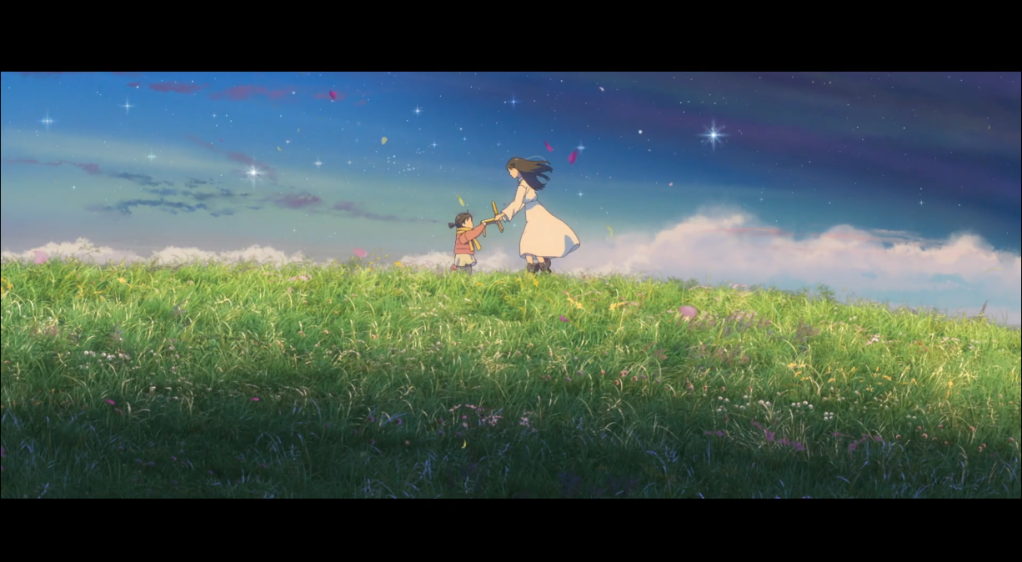
My personal history with Shinkai is perhaps atypical. The first thing of his I watched was Voices of a Distant Star. In a way, I see Voices as emblematic of my Shinkai. Here is a guy who began working in the video game industry, who ended up writing, directing, animating, and editing his own little OVA. It’s tangible evidence of his earnest desire to create and tell a story he wants to tell, and even in Suzume, his most recent film, this utter lack of pretense remains. It gives the impression of a guy who’s just trying his best.
I like this about Shinkai’s works. I like it a lot. I find the seeming pureness of intent endearing, which might be naive of my part considering I don’t the man and, for all I know, he could be cynically making whatever he things is going to sell. But I don’t think that’s the case. And it’s perhaps why I’m eager to look for deeper meaning in his work.
After Voices, I saw… nothing of Shinkai’s until Your Name., Tenki no Ko, and Suzume in theaters as they released. This is where the rest of the article begins.
I. Your Name, Longing, and Existentialism

I actually wrote about Your Name. for Crunchyroll back when the movie was released in the US in 2017. It’s interesting reading that article now, six years and two more Shinkai films on, and remembering what a genuine phenomenon the movie was. It got mainstream coverage, well extending its reach beyond the typical anime crowd. Even NPR covered it! My writing at the time, maybe caught up in the popular excitement about it, focused relatively little on the actual themes and content of the film, describing instead its effects and qualities.
What’s interesting about that, though, is that I came back to try and write about Your Name. later in the same year in a still-unfinished blog post drawing parallels between Shinkai’s bombshell and the much, much less mainstream anime Land of the Lustrous. Those parallels? The ennui and search for meaning that rest at the heart of each story. Sure, Your Name. is superficially all about what’s ungenerously been framed as “tfw no gf” (that is, if you ignore the more-than-half of the film that’s about Mitsuha). But if you can get past that memetic way of talking about Shinkai, I think it’s quite obvious that Taki and Mitsuha’s respective searches for the unidentified “something, someone” are not entirely about finding romantic love.
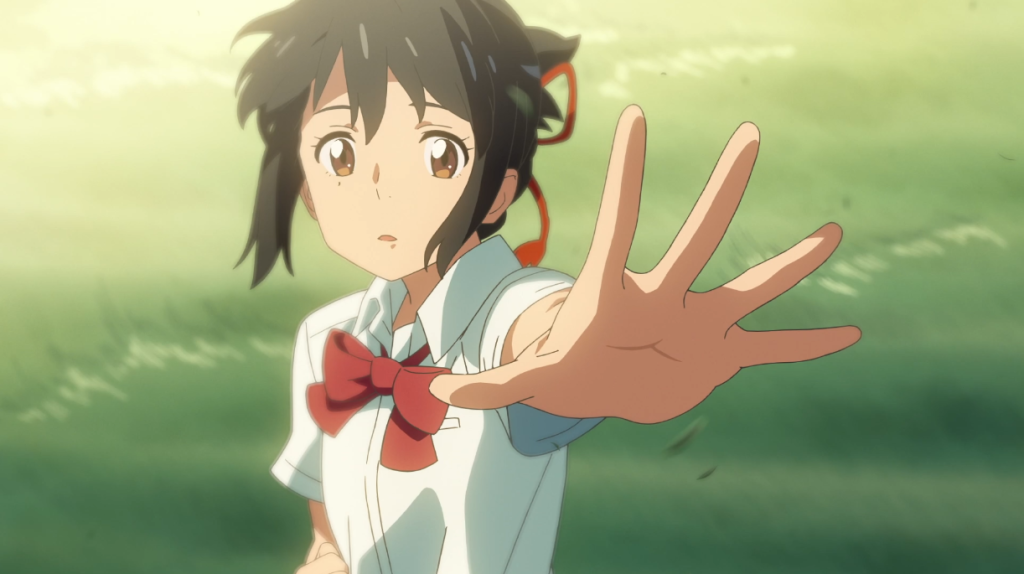
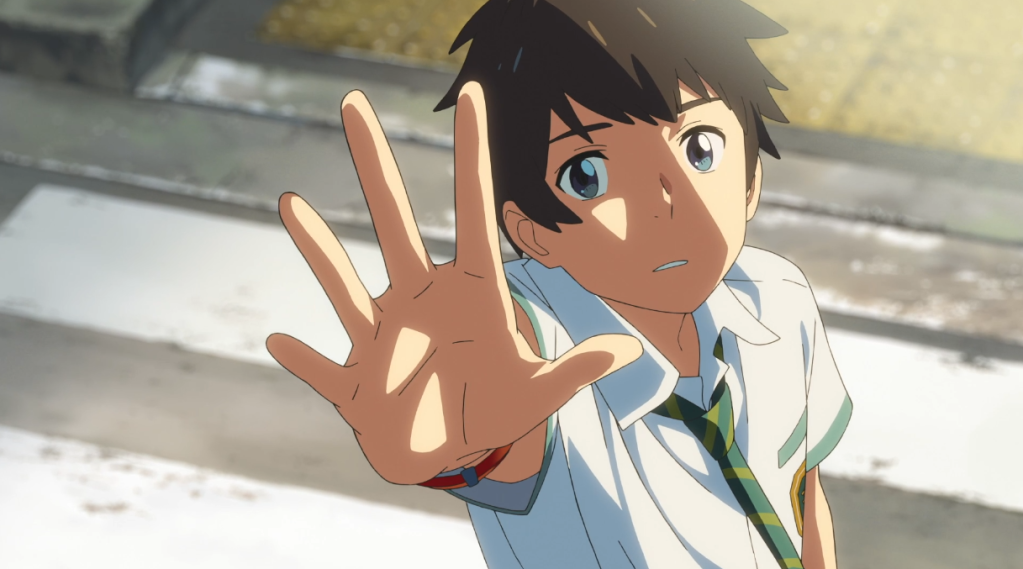
Do you remember the opening lines of Your Name?
“The dream I must have had, I can never recall. But the sensation that I’ve lost something lingers for a long time after I wake up. I’m always searching for something, for someone.”
Like, sure, I guess you could take the final word and make the argument that this is just a more poetic “tfw no gf.” But the palpable sense of longing, of something missing, of just… what the hell is life? I don’t think it really lends itself to such a cheeky, simplistic summary, because who hasn’t woken up in the morning (or laid in bed at night) just wondering what the point is of this existence thing?
This is further reinforced by the pairing of the body swap romance with a comet strike evocative of the Great Tohoku Earthquake. There are few things in life that are so profoundly diminishing to the human soul than nature reminding us that we live at its mercy. There are no explanations for natural disasters. How do you make sense of the motions of an existence so big it contains all humanity? All that remains is the deep pit of realization that each of us is a mere tiny existence with only the merest shade of control over our own destiny. This, by the way, is why the first ending of the film (not the stairs) is so satisfying despite the lack of romantic resolution. The escape of the Itomori citizens from their random, inexplicable fate is perhaps what we all crave—control of the uncontrollable in our inconsequential lives.
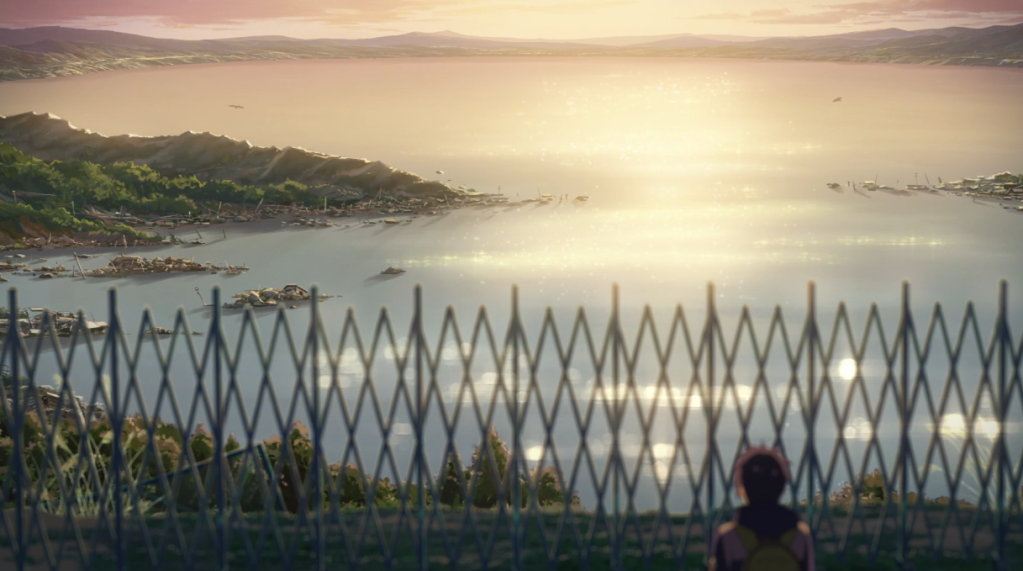
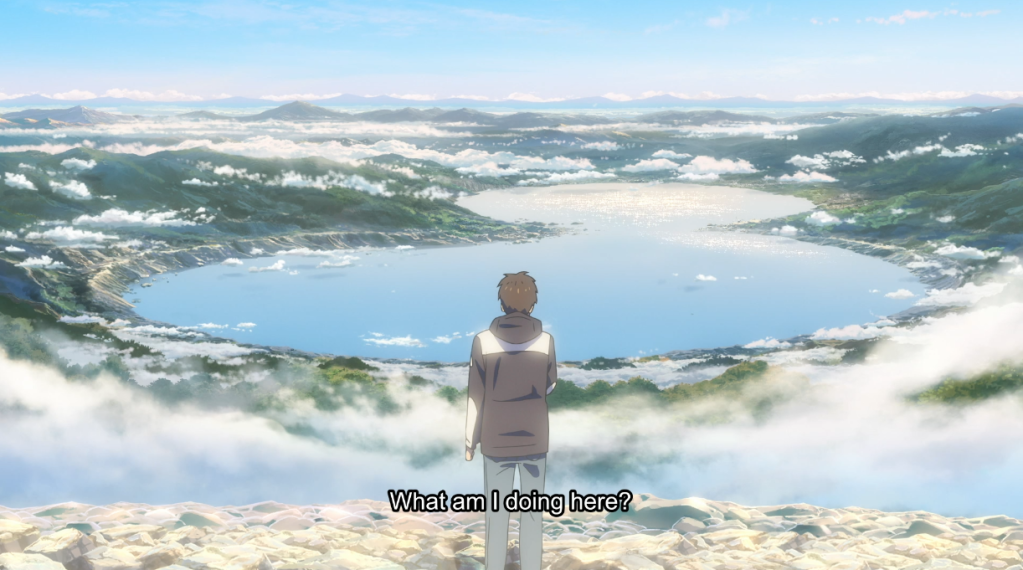
I have no evidence to prove it, but I think this aspect of Your Name. is one of the reasons why it made such a global impact, instead of the 3.11 parallel only connecting with the Japanese audience. The whole film is archetypal much in the way Nisekoi is, a near-perfect execution of its type and genre; but unlike Nisekoi, its archetypes aren’t drawn from the hyperspecifics of anime subculture. It’s almost like a fable, Shinkai’s greatest hit—a modern fable that ties star-crossed romance to rural-urban contrasts to our human fear of the fickle Earth. In this one, we as Taki and Mitsuha escape our fate, conquering the dread of an uncontrollable existence. “tfw gf :)” at the end is only the icing.
II. The Sunshine Girl Lives in Tenki no No

I accept that Your Name. could be classified as “tfw no gf” content, even if I think it’s boring, lazy way of viewing the film. But saying this about Tenki no Ko is my personal litmus test of whether someone’s opinions about Shinkai are worth listening to or not. Because, yes, Tenki no Ko is a boy-meets-girl story. But the longing at the core of Tenki no Ko is completely different than the longing in Your Name.
Your Name. is pure existentialism. Tenki no Ko is about just trying to survive.
When I wrote about Tenki no Ko in 2020, just before COVID hit, I summarized the differences between its predecessor and it as being “broad” and “narrow,” respectively. I still believe this binary as being accurate, but perhaps an even better one is to say that the first is “universal” where the second is “personal.” There is a visceral, almost gritty aspect to Tenki no Ko that is nowhere to be found in Your Name. Further, the way the main couple are portrayed is jarringly different. Where Taki and Mitsuha are active, intelligent, self-aware teens, Hodaka and Hina are cast as much more innocent, much more vulnerable, and much more desperate.

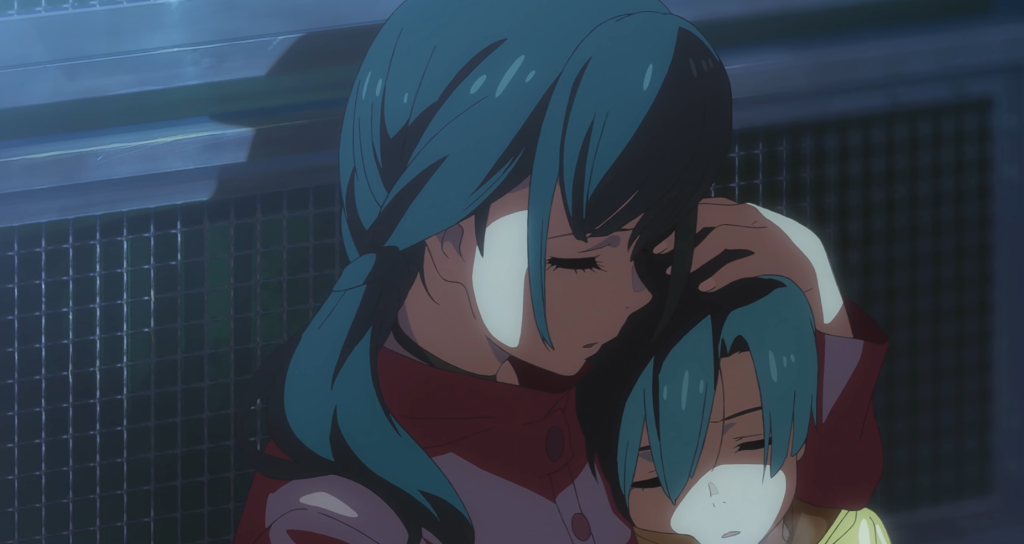
Who cares whether you have a girlfriend or not when you’re just trying to get through the day? Hodaka and Hina aren’t drawn together by a red string of fate. They grow close because they are trying to get through life with only each other to rely on (or some approximation of that).
Tenki no Ko is a very messy film. Its use of a climate change analogue so unsubtle that it’s essentially just climate change with a little more magic, its uneven plot, and the gun make it far feel far less realized than Your Name. But even if Your Name. is technically the better movie, I think Tenki no Ko has way more heart. It’s personal and emotionally charged, and those emotions are grounded deeply in its characters’ situations. In Maslow’s terms, Tenki no Ko is at the bottom two sections of the triangle. This is why when Hina is asked to be noble and sacrifice herself, it feels so horrifically unfair. Why should she, someone who is barely getting by, be asked to give up everything?
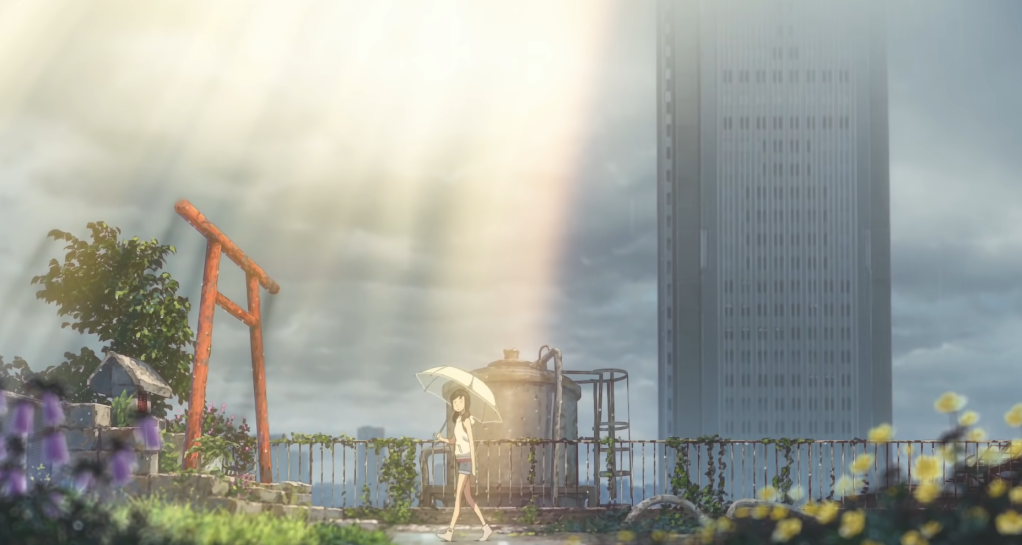
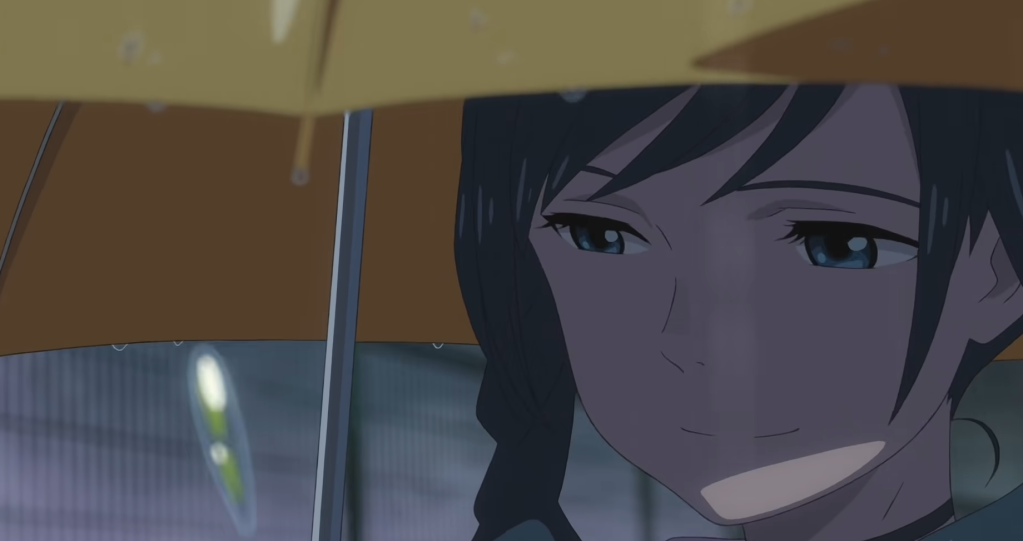
Just like at the end of Your Name., Tenki no Ko offers the possibility of a great escape. (Editor’s Note: Somehow, I completely forgot one of the big songs from this movie was literally called “Grand Escape.” This was not planned when I wrote the article or title.) Except this time, it’s not our archetypal proxies escaping from the universe’s void. It’s a fifteen-year-old girl being given the chance to reject an unjust world that demands she be lost so it can continue on. The inescapable unfairness of life and society has been, for once and for a time, escaped. The personal triumphs. The sunshine girl lives.
III. So… about Suzume
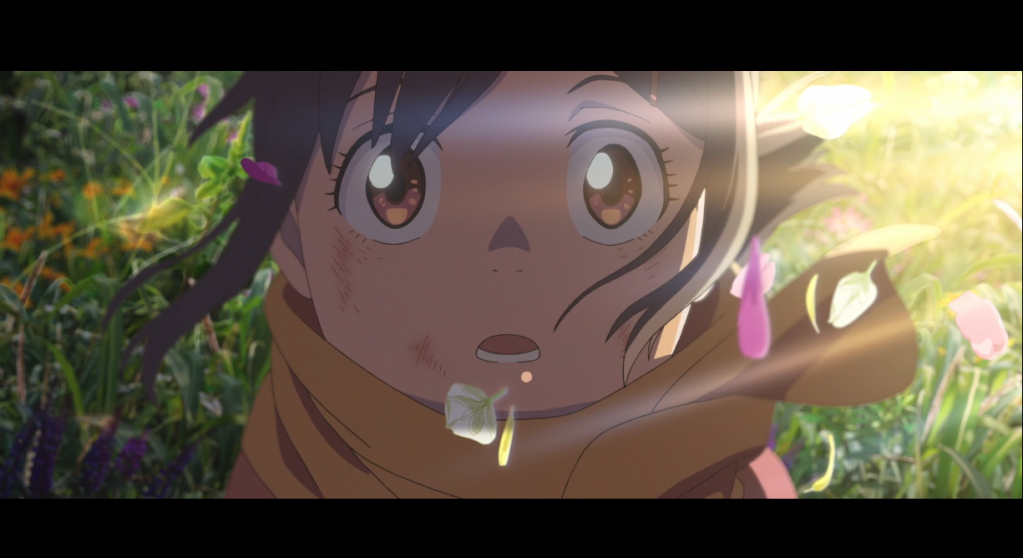
Even if Tenki no Ko is kind of a mess, I think the first two installations of Shinkai’s disaster films trilogy have pretty clear ideas of what they’re about. Suzume is… different. This is doubtless because Shinkai originally didn’t want it to be what it ended up being (a boy meets girl story), but actually wanted it to be a romance between two girls before being persuaded to change his mind by a producer. From Looper:
“At first, I wanted to turn this story into a movie about Suzume and another girl journeying. Why I even wanted to go in that direction in the first place is because I personally felt a little bit tired of telling the very traditional romance story,” Makoto Shinkai said. “I felt that in ‘Your Name,’ I [did] everything that I possibly could in terms of ‘boy meets girl’ and ‘will they, won’t they, will they meet.’ That element of romance is very relatable to the masses, which is why it was a subject matter that resonated with a large audience.”
First off, I want to note that Shinkai specifically cites Your Name. as a “boy meets girl” film—suggesting he views Tenki no Ko the same way I do, a completely different kind of film. Secondly, knowing this I can’t help but feel kind of sad thinking about my experience watching Suzume. As funny as some of the chair stuff is (and make no doubt that this is the funniest of the trio of films), it feels like what it is: an excuse for Shinkai to not have to do the thing he said he didn’t want to do again, even though he’s been told to do it again. I wish I could have seen the Suzume he really wanted to make.
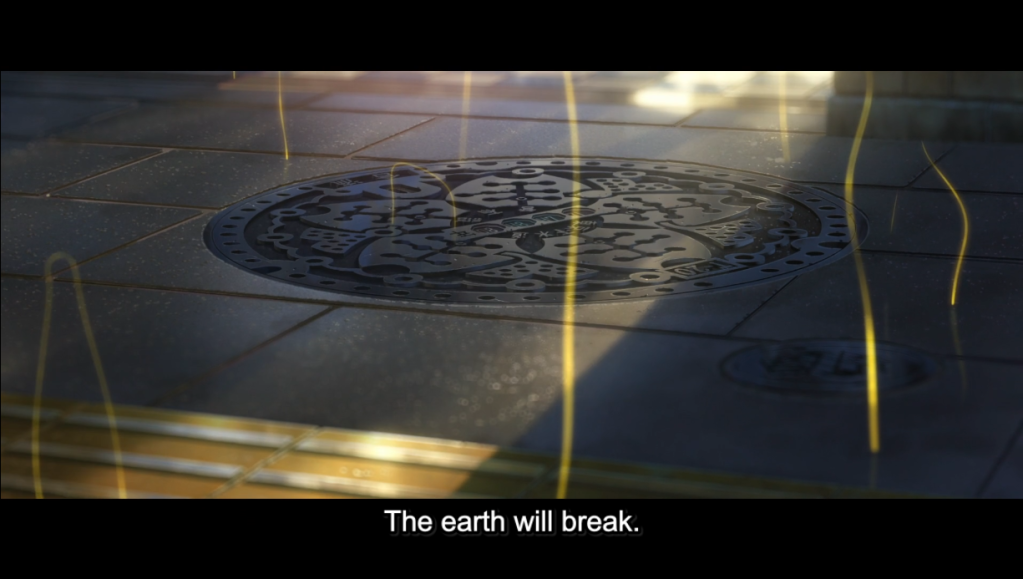

That said, I do still think there is a heart to Suzume. It’s not really there throughout most of the film’s scattered road trip narrative, but it does come through cleanly at the very end in Souta’s earnest prayer to the gods and Suzume’s words of comfort to her younger (cross-dimensional?) self.
In his prayer, Souta does two things. First, he echoes the refrain he and Suzume have been using throughout the film, “returning” the land itself to the gods. Second, he makes a plea that, despite the fleeting nature of life and the nearness of death to humanity, “we wish to live!” Perhaps it’s my Catholic background talking, but I found his desperate prayer compelling. The giving up of control and the begging for survival feel like a profound acknowledgement of his own—and, by extension, humanity’s—inability to preserve itself. Faced with inescapable destruction (a worm this time instead of a comet), what can we do but beg? “Give to Caesar what is Caesar’s;” only the gods can control the land. The disaster is averted by the prayer.
Then, we come to Suzume’s conversation with her younger self. At the end of a meandering movie, I didn’t expect to find myself tearing up, but the tears came. Why? Because in elder-Suzume’s words I felt I heard Shinkai himself trying to speak to all those who have stood in the place of young-Suzume (and perhaps even to himself). Despite the cliche-laden script, the intent comes through. “Ah,” I thought. “He wants to offer comfort to all those who have seen the endless night and wait for the morning to come. He wants to give them hope.” It’s not graceful and it’s not well-crafted into the film as a whole, but it’s there.
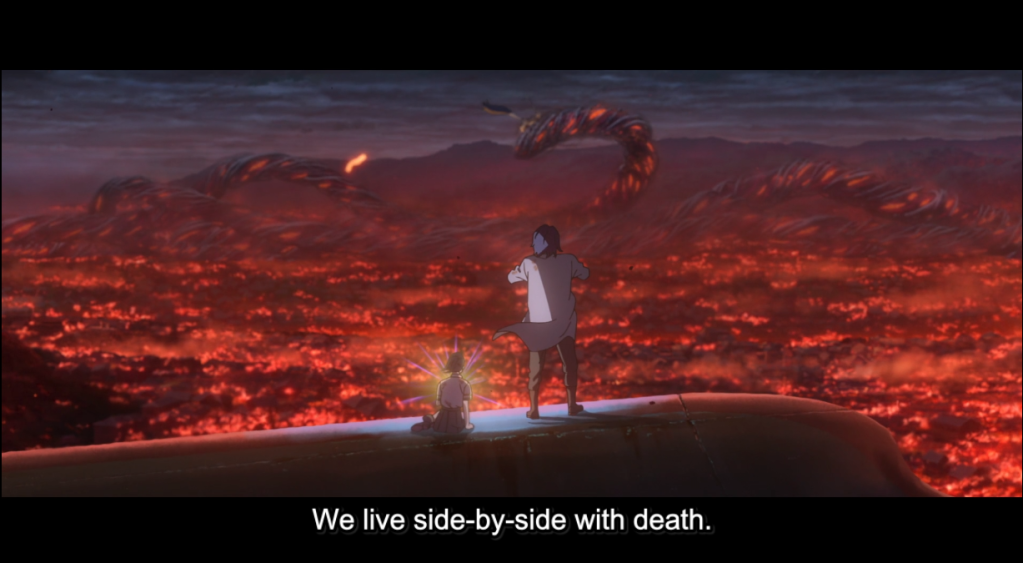
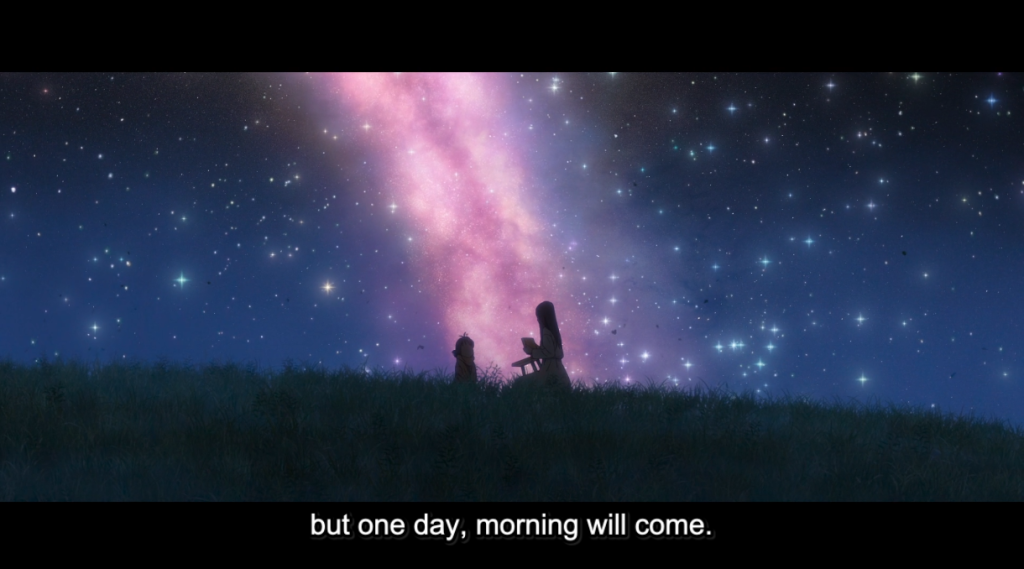
What’s really fascinating, though, about these two endings to Suzume is that they seem to come from an entirely different place that the endings to the two prior films. Where Taki and Mitsuha use space-time magic to help Itomori’s people escape the comet strike on their own, control in Suzume is ceded to the gods by Souta’s prayers. Where Hina and Hodaka have a choice reject the world’s unfairness so they can live, Souta can only beg and enact a ritual that still doesn’t end his duty to seal. The damage has already been done; Suzume’s mother has already been dead for years. There is no great escape this time.
Shinkai can write up as much magical realism as he wants, but he can’t make reality go away. In real life, the fantasy of escape—from our uncontrollable lives, from the unfairness of the world, from the longing in our hearts—is just that: Fantasy. And so I wonder if that is why Shinkai, having witnessed yet another great disaster visited upon humanity as he worked on this film, ends up at the simple act of offering comfort. For him, perhaps, the final escape is not an escape from the things the haunt our existence, but the escape that comes from accepting them and looking to the future.
I’m not well versed in Japanese, but it struck me at some point that suzume (??? in the title) is only a character off from susume (?? [???]); advance, move forward). Who knows if that’s by design, but I think I’d like to think it is for the thematic resonance.
Maybe that’s the only escape we can really hope for, the one called “hope” that lets us move toward our tomorrow.








